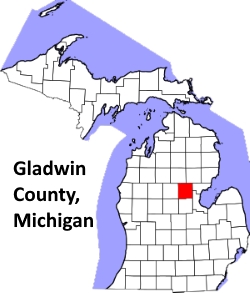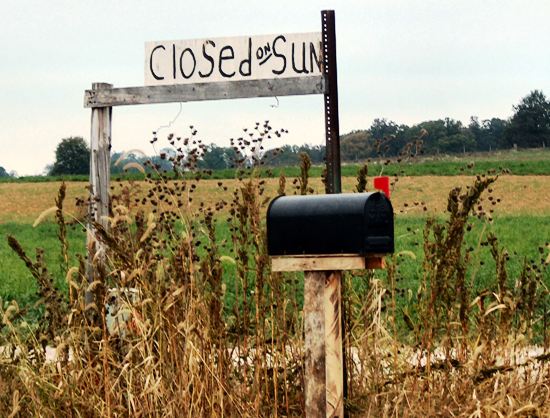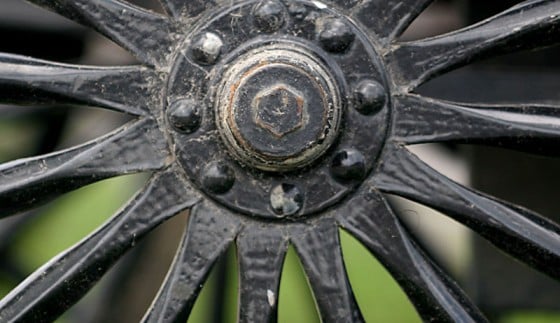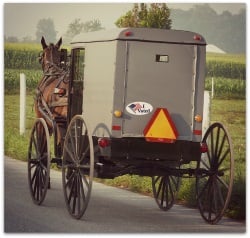Four Amish Youth Plead Guilty To Underage Drinking, Disturbing The Peace
“This kind of stuff happens all the time with them.”
That’s area resident Cyndi Tipton, on an incident involving local Amish youth.
The young men’s behavior led to charges including underage drinking and disturbing the peace.
The four young Amish men, ages ranging from 19 to 20, also were charged with providing false information to an officer. The area in question is Gladwin County, Michigan.

All four pled guilty to the charges Wednesday in Gladwin’s 80th District Court. From the Midland Daily News:
Mast went first.
“I want to plead guilty and settle this,” Mast told Post.
Post continued to hear guilty pleas from Zook, and then Miller.
“I’m pleading guilty because I am guilty,” Miller told Post when he was asked if he was threatened or coerced to plead guilty.
Troyer, who also pleaded guilty, said he didn’t remember what false information he gave the officer, but he remembered it was false.
Post accepted all four men’s pleas.
While the Gladwin County Sheriff’s deputies said a person called the department saying the men were tossing beer cans from a buggy into the roadway at Beaverton and Bard roads, none of the men admitted to that. They said they caused a disturbance with their loud music. There was no mention of tossed beer cans. Yet, the four admitted to having beer, whiskey and vodka in their possession.
Each of the three charges carried a potential 90 days of jail time and fines; by pleading guilty the youth evaded jail and probation. They were ordered to pay $700 in fines and $150 in court costs.
A rise in issues
Some Amish areas have real problems with alcohol and substances. Last summer we saw the case of Amish youth in Ohio abandoning a buggy after being pulled over for drinking-related violations.
According to Gladwin County Sheriff Mike Shea, this is part of a rising trend in his area.
 The incident occurred in the afternoon, with the complaint being reported around 4 PM. The Sheriff says this is happening with youth, on Sundays in particular.
The incident occurred in the afternoon, with the complaint being reported around 4 PM. The Sheriff says this is happening with youth, on Sundays in particular.
The Gladwin County area is home to two separate Amish communities, each about five churches in size.
One lies fully within Gladwin County. The other, a Swartzentruber community, is found both in Gladwin and neighboring Clare County.
In some Amish communities, this behavior would not be tolerated. In others, it seems to be an embedded part of the culture, at least youth culture.






Amish and alcohol
Proof that too much repression begins to feel like oppression, and people, especially the young, will rebel. Sometimes, with bad consequences.
Or maybe this just happens to be a wild bunch of youth. We also see completely “un-repressed” non-Amish landing in similar, or much worse, trouble. Or maybe the culture and the expectations in this particular Amish community conveys the message that it’s “okay” if the youth get a little wild as long as they clean it up by the time they join church. Saying it’s “proof” suggests you know the full story here. If so, I hope you’ll fill us in further.
Amish and alcohol
Teens don’t usually rebel unless they have something to rebel against. What is a “wild teen”? Most teens rebel against something. It’s part of the process of growing into independent adults. What these four boys did was not unusual for teens, just for Amish teens. Although I admit that I find it hard to believe that what they did is a rarity. These four just happened to get caught.
This was not that unusual. This happened over the weekend in the large northern Indiana Amish settlement:
https://wsbt.com/news/local/police-bust-2-underage-drinking-parties-saturday
‘Nearly 40 teens were arrested over the weekend. Local police say it was connected to an Amish tradition.
…
Those parties had more than 200 attendees, and according to police, they were mostly young and drunk. Aside from all the noise they created, the kids left behind a lot of trash just off State Road 5 in LaGrange County.
Brenda Jones says she didn’t hear it but saw the aftermath on her way to church.
“We just saw a lot of beer cans laying and cups and stuff all over the yard and just a lot of vehicles parked there in the morning,” said Jones.’
——————————-
As I wrote in the post, certain communities have reputations for these issues more than others. The place where this party took place (northern Indiana) is one of them. Another is Geauga County, Ohio.
“Wild teens” in this context are those that go to these sorts of parties, drink alcohol, possibly get a driver’s license and a fast car, behave like the four men who were the subject of this article, or in some cases get into worse things (drugs and so on). There are many other Amish teens who steer clear of those activities and would be difficult to classify as “wild”.
As far as Amish group activities, there are supervised groups and unsupervised ones. To take one example, after notorious drug busts of two young Amish men in the late 1990s (2 Amish young men age 23 and 24 buying cocaine from a motorcycle gang and distributing it to youth in the community), Amish parents and the church in Lancaster County pushed for supervised groups. Those groups have flourished in that community. There are similar groups in Holmes County, Ohio for example. But that’s not the case everywhere.
Amish and alcohol
It’s tough being a parent to teens. Amish or non-Amish. As I sad in a previous post, give a teen enough rope and he/she will either hang him/herself, or stick to the rules. They might pull at that rope, but their sense of right and wrong usually kicks in. When teens regularly behave badly or make poor decisions, it has a lot to do with depression, a sense of missing out or not fitting in. Higher education is highly discouraged, if not forbidden, and following one’s God-given personality and need to try something else, is risking shunning. Shunning for these kids is the most difficult consequence once they’ve made the decision to leave. Parents should be there for their children, no matter what. These kids appear to have decided to thumb their noses at their traditions or rules. Most know that they are doing the wrong thing, but, I think they don’t feel they have any other way of expressing their frustration with their old traditions and rules. I worked with at-risk teens for 22 years. The common thread among all those teens was an inability to express feelings and frustrations within societal constraints. They frequently complained about unrealistic expectations and not being listened to. Did I have a few students who ended up in jail or rehab? Yes, I did. It was very sad to watch those students go from bad to worse. Were there any of those students I was worried would bring a gun to school, one day? Yes, there were a few. Their anger at the world was almost palpable. But, that’s another issue. With these Amish boys, and maybe girls, there just seems to be a desire to get drunk on the weekends to dull their boredom. I hope they are given professional mental health care. Prayer doesn’t always solve all issues.
Reaction or Reactionary
I said it prior, and its worth repeating.
I think the kids got caught, recalled their morality, and responded with support as was socially suitable. These are kids who simply went too far and will be held accountable for their actions. They went too far with their shenanigans and are now on a short rope. I don’t think it was rebellion as much as there was experimentation, and it got too far – the words “I had too much to drink” are not a part of any youth’s verbal repertoire.
I don’t see much in this, aside from the glory of the news media parading this out. This kids acknowledged responsibility, they will very likely follow through with repercussions, and this will be sewn up. I don’t see them as repressed as much as they were given liberty to do what they wanted, like any teens. And like a handful, they got caught.
There are so many ways this could have gotten uglier, and it did not because they remembered some of their teaching and morality. I think this will be like a social specter, of people looking from outside, but sin is sin, and they will be forgiven from within the community, and it will be forgotten, and I think that is instructive for all other observers, including ourselves.
Amish and alcohol
Dr. K: “I had too much to drink.” is not part of any youth’s verbal repertoire? I worked with “at risk” teens for many years. I can assure you that those words are indeed, part of their repertoire! Those four Michigan Amish boys admitted their guilt in order to move on and avoid further shaming their parents. An appropriate decision. They might think twice before drinking again. It’s more likely they will think twice about getting too drunk again.
Odd...
Odd indeed. I really don’t think of the young kids in our neighborhood (mostly Methodist, Baptist, Presbyterian, a few Catholics, some no church people at all) as being repressed and oppressed, but quite clearly they must be — I mean we have this kind of behavior going on here, too. How sad is that?
Amish and alcohol
If you were to ask a group of teens, most would say they feel oppressed by rules. Many will be mature enough to admit that they know rules are there for their safety. Some will not. Most non-Amish teens do not have as many rules as the Amish, and other cult-like religious groups. Most “English” teens receive an education that goes beyond 8th grade. It is the law that they do so. College is an option for all “English” teens. Most “English” teens are allowed to join after-school clubs, sports, and other extra-curricular activities. Amish teens do not. They have limited education, thereby limiting their opportunities. They are strongly discouraged from experiencing life outside Amish constraints. They start working as soon as they finish their schooling. Most marry young and start having children almost immediately. One Amish young woman, (27 years old,) already had six children and was expecting her 7th. I asked her if it was easy for her. She said it wasn’t too bad as long as she had only one child every 12 months. Amish teens’ lives are decided for them. If an Amish teen decides to leave after “Rumspringa”, he/she is shunned. There is no support for them afterwards. Teens are already confused by everything that is thrown at them as it is, but, when those teens aren’t given any tools to handle what is thrown at them, that is when a feeling of oppression/depression depression set in. “English” teens receive counseling in schools, outside of schools etc. Not all avail themselves of it, but, it is available. Teen suicide is high across the board. Amish suicides are higher because they have nowhere to turn. For most teens, reading Scripture is not enough to get out of a deep, chronic funk. Most Amish suicides are classified as “accidents”. “English” authorities don’t usually delve too deeply into Amish deaths. Teens are easily depressed as it is. There is a difference between a life filled with rules or constraints that limit opportunities for happiness and fulfillment, and one that is not. I see where Amish elders are coming from, but, living a lifestyle reminiscent of the 18th century does not necessarily make one closer to God. I’ve met quite a few Amish families over the years, and spoken to many of the women and teens, and not one of them said they lived their lifestyle by choice. A few went so far as to say that they didn’t think it was fair that only men had a say in the ordnung. Child abuse, wife abuse, animal abuse, depression, suicide, alcoholism; all exist in greater numbers within the Amish community than the Amish will admit to. What the four teens in Michigan and the other teens in Indiana do, that is symptomatic of a lifestyle that is not working for some in those communities.
Four Amish Youth Plead Guilty To Underage Drinking, Disturbing The Peace
I found great respect in their acknowledging the difficulties they caused. I was relieved to hear they would plead guilty based on others reports. I am curious to know that they would not plead to tossing trash out the buggy.
I cannot imagine this event will haunt them into the future. Would this be considered a Rumspringa-type event, but this time with real rum (I extend the pun). Given all circumstances, they will return to the community, become baptized, and return to a more sedate lifestyle.
I appreciate Erik giving us a balanced view of experiences among the Amish. I don’t judge these youth better or worse than others. They are youth.
Youth
Well said, Dr. K. They, like you stated, acknowledged their loud music and disturbances. It’s possible they didn’t toss the beer cans. Most teens act out one way or another for a spell; Amish are no different. As you say, “they are youth”.
I'm more skeptical
Dr. K it is interesting, as far as the idea of great respect, when I read the report, I didn’t really get a sense one way or the other about it.
What I mean is, there was no report of them expressing contrition or an apology (maybe it happened but wasn’t included, but if it was said, it seems like it would be a good detail to include in the article).
In their statements I saw a brief admission of guilt and the statement “I want to plead guilty and settle this.”
I don’t know these young men, but that sounds like “I want to get this problem over with,” the most pragmatic approach – admit guilt and pay some $$ – to solving the trouble they got themselves into.
Fair enough, but I just don’t see any evidence, in the report at least, suggesting that they will now calm down and return to a more sedate lifestyle. I am not trying to read this uncharitably, but I’m also not confident that this one incident will be enough to set everyone on the straight and narrow. It may just teach them not to do dumb things like throw beer cans out of a buggy and disturb the peace while you’re drunk. Maybe I’m wrong, and I’d imagine at least some of their family and church would hope that to be the case. Thanks for your comment.
Not that unusual!
Erick,
Back going on two decades, I had a typical “English” idea of the Amish and their seemingly charming lifestyle, passive and polite demeanors, devotion to religion, and love and genuine dedication to family. I must have read too many ‘Bonnet books” and series like “The Waltons” and imagined them similar.
When working among Amish, however, these idealistic thoughts are stamped out quickly. Amish life is hard here in the northeast. Many Amish are spread out and are remotely located, and there are lots of Amish/Mennonite subgroups that do not get along. Amish also have issues with the neighboring English as well [buggies/manure/farm dumping.
Unlike Amish in Pennsylvania, there are no tourists, no famous Amish restaurants, no local bakeries, and no quaint B&Bs hosted by Amish families. There are several scattered off-the-beat bulk supply stores, and businesses that are seasonal; Amish furniture and sheds, seasonal goods, and Amish quilts are featured. While Amish families are settling here sill trying to make a go at mainly dairy farming [that has become all too difficult for most], there are Amish families that move out of state back to where they originated or to Maine, or over the boarder to Canada.
The barn is where males age 15 and up gather, and there’s many “verboden” activities from drinking, smoking, gambling, radio playing, use of cell phones, etc. – all behaviors done after supper and evening chores. It is my opinion the Amish women know this goes on, but do not acknowledge. And I am not talking Rumspringa here! Some of these men who barn gather are married, and older – it’s where Amish men gather.
Amish life for some here is not like the English think. They are not all sitting around the kitchen table with a big baked ham, tons of side dishes, and home baked goods. Kitchens are oftentimes dark, chilly, very casual and very young daughters are heating canned soup, or opening up canned meats, canned vegetables, boiling egg noodles, and passing around soft dinner roles and eating boxed Entenmanns cake with coffee as a treat.
What I do know is this; I’ve never at any time seen an Amish male [single or married] be disrespectful to me or any other English woman – ever! I can go further than that — they are entirely respectful to their family and particularly their parents. So the Amish male is human – some do a few things here and there that are law breaking or not within their Amish rules. They usually come to their senses sooner or later, and march right along doing hat is expected, working long days, and making big families. Understand I can only speak to what I have personally witnessed. I’m not painting an ideal and saintly picture of the Amish men, and know full well this is not always the case. It is simply my personal experience.
Maureen I think your comment does a good job of illustrating the contrast between a large, technologically progressive, business-oriented community like Lancaster County, which tends to get a lot of the public attention, and the dozens or even hundreds of smaller, slower and more isolated communities. And of course there can be a lot of variety among those depending on how “high” or “low” the group is, what the economy is like in the local area, and so on.
And you are right that it is not all a picture-perfect gather-around-the-hearth lifestyle eating only wholesome organic foods. Some Amish have pretty poor diets eating a lot of processed and store-bought foods. In some cases this is due to income and in some due to habit and custom.
It also illustrates the contrast in what is permissible behavior or “look-the-other-way” behavior in some communities versus others. Things like smoking and drinking which are the norm in some places (eg, the Amishman I met in NC a couple months ago was comfortable smoking at the auction and in front of us at his home; it is customary in his community, whereas in others tobacco wouldn’t ever be seen publicly). Thanks for sharing this.
That’s very wise of the Amish who channel the teens’ activities. The best way to protect them is to prepare them, guiding them to practice finding joy in the best ways. Example is the best teacher and I’m learning that some of the adult men sometimes drink and smoke? Is that common? I’ve never seen my Dad or Grandpa do those things (they were Mennonite). I thought it was against their religion.
Smoking and drinking is generally a “lower” (ie more traditional, conservative or “plainer”) Amish practice, and also can be seen more often in specific communities.
Among Swartzentruber Amish, smoking is generally accepted and common (though there may be some variation in that as there are now multiple Swartzentruber affiliations).
Alcohol is commonly accepted in some communities and some have problems associated with it. Adams County, Indiana is one where alcohol is pretty common.
In contrast to this, Amish in other places neither smoke nor drink, or might just drink a small amount of homemade wine from time to time, “for health”. There are also affiliations of Amish which are staunchly against alcohol and tobacco. The New Order Amish churches fit this description.
You can also see examples of daughter churches forging a different path from their parent communities. For example, tobacco is raised as a cash crop in Lancaster County. When Amish from Lancaster County started spin-off settlements in Indiana in the mid-1990s, they made a clear decision to not permit tobacco farming there.
Thank you Erik, that’s all very interesting! As parents, we’re still learning too and there’s a lot we’re up against, especially in our modern world, so it’s good to not judge one another and forgive ourselves too as we learn.
A big part of learning is failing. We try to do all we can so our children learn in the small loving world at home, rather than in the cold cruel wold. Sometimes they don’t co-operate, but hopefully eventually we will all learn.
Addiction Recovery
These addictions are designed to be extremely addictive. Do the Amish have addiction recovery groups? Have you heard of them using outside resources, like the Alcoholics Anonymous 12 Steps? It’s been powerfully successful in helping millions break free from these terrible traps. Most churches have these resources. Mine offers groups online and in person at https://addictionrecovery.churchofjesuschrist.org/?lang=eng
Addiction Recovery
Correction, there are online resources not groups on that website. There are real case videos of individuals overcoming addictions with each of the 12 steps.
All Kinds of Addictions
And all kinds of addictions, including sexual addictions.